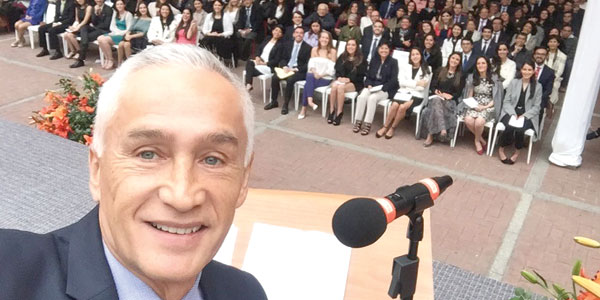
By Jorge Ramos
Let’s be honest: Social media is a jungle. There’s always someone out there ready to attack; you never know when it’s coming, or from whom. Even words typed with the best of intentions can en d up distorted and crushed when you’re online.
Nevertheless, social media is also an incredibly exciting and dynamic environment, packed with information and a wide diversity of viewpoints — it is open, filled with the unexpected, challenging and, yes, useful. That’s why most of us are online.
It’s true that many have recently decided to quit (or flee?) Twitter, Facebook and Instagram because of all the senseless fighting and verbal violence. I respect this decision; this community of anonymous (and not so anonymous) people isn’t right for everybody.
Ultimately, the world doesn’t need to know what you had for breakfast this morning. Nor do we, as news consumers, need to read the opinions of someone we’ve never met (and who doesn’t even post a picture or use a real name) on the Syrian war or the crisis at the United States border with Mexico. That’s just digital torture.
Despite all this, I’m not going to stop using social media. Why? Because then I wouldn’t get to hear the voices of the opposition in Venezuela (@jguaido), Nicaragua (@cefeche) and Cuba (@yoanisanchez), all of which are censored in the official press; or the opinions of Democratic Rep. Alexandria Ocasio-Cortez (@AOC), whose ideas are making the Washington establishment so uncomfortable.
Nor would I have access to the morning news conferences of Mexican President Andrés Manuel López Obrador (@lópezobrador_); or the videos posted by those who have witnessed terrorist attacks in places I can’t go myself; or the pictures of all the places I want to visit on my next vacation; or all the spot-on, witty corrections Paulina Chavira makes to our grammar (@apchavira); or the tantrums and lies of the most powerful man on earth (@realdonaldtrump); or the struggles, reported firsthand, facing “Dreamers” and immigrants; or the instructions of the local weather forecaster when a hurricane is approaching my home in Miami; or the opinions of the many people who don’t think like me and want me to know it. There are a million more reasons.
Social media’s unique ability to put me in touch with new people and new ideas is what makes me grab my phone each morning before I jump out of bed. I follow around 100 different people and media outlets, just another user with a couple of hours a day to spend in front of the screen.
Of course, I also use social media because it’s in my best interests professionally. I firmly believe that I wouldn’t have my job on television if I didn’t have a presence on social media. Many people are moving from big screens to small ones. So, unless I want to be a dinosaur at risk of extinction, with only a TV news show that broadcasts at a certain time, I have to create a following online, where there are no schedules.
That’s in part why, a year ago, I launched “Real America,” an online English-language news program that airs on Facebook Watch. Through the show, I meet many young people who don’t even own a TV.
Being active on social media has also kept me safe. I was freed in Venezuela, where I was briefly held with my Univision crew this past February following a fateful interview with President Nicolás Maduro, in part because of the storm of tweets the incident generated.
Sure, we could live without social media. But, as a journalist, I choose to stay online — even with the risks involved.
I know, for example, that strangers may be spying on my online activities. I agree that we urgently need new laws to ensure that companies respect our privacy, refrain from sharing our personal information and stop providing a platform for hate groups.
But even without these laws, we aren’t defenseless as we make our way through the digital jungle. Blocking people is one of the great small pleasures of online life. I regularly block people who bad-mouth others or turn to personal attacks. I also block bots — faceless trolls with no followers.
I’m on social media because it’s an extraordinary communication tool, providing a unique space for me to test out my ideas and arguments. Why would I refuse to use one of the most important inventions of our time?
The bottom line is that we’re free to use social media in whatever way works for us. And with only one click, we can leave.
If there’s anything you want to tell me, you can find me on Twitter at @jorgeramosnews, or on Instagram and Facebook.
___________________________________________________________________________________________
Por Que No Dejo Twitter
Seamos francos: Las redes sociales son una jungla. Siempre hay alguien atacándote; no sabes qué es lo que te pica y hasta la mejor de las intenciones termina tergiversada y aplastada. Pero es un espacio diverso, exuberante, intenso, plagado de información, abierto, sorpresivo, alternativo, emocionante, cuestionador, agresivo y útil. Por eso lo habitamos y no nos vamos.
La combatividad irracional y la violencia verbal en Twitter, Facebook e Instagram ha hecho que muchos, últimamente, anuncien su salida — -¿huida? — de las redes sociales. Lo respeto; esta comunidad de anónimos — y no tanto — no es para todos.
No hay ninguna necesidad de reportar al mundo que desayunamos un jugo verde o de leer la opinión de un desconocido — que ni siquiera pone su foto y nombre real — sobre la última crisis en la frontera o en Siria. Eso es, casi, una tortura digital.
Pero me rehúso a dejar las redes sociales porque me perdería las voces de la oposición que son censuradas en la prensa oficial de Venezuela (@jguaido), Nicaragua (@cefeche) y Cuba (@yoanisanchez); o las ideas de la joven congresista Alexandria Ocasio-Cortez (@AOC) que tanto perturban al establishment de Washington; o las inusuales conferencias mañaneras de Andrés Manuel (@LópezObrador_); o los videos de testigos de accidentes y actos terroristas donde, físicamente, no puedo llegar en un minuto; o las fotos de los lugares a donde quiero ir en mi siguiente vacación; o las puntuales y divertidas correcciones gramaticales que nos hace Paulina Chavira (@apchavira); o los enojos y mentiras del hombre más poderoso del mundo (@realdonaldtrump); o las luchas de los “Dreamers” y de los inmigrantes en primera persona; o las instrucciones del meteorólogo cuando hay un huracán cerca de mi casa en Miami; o las opiniones de mucha gente que no piensa como yo y que quiere hacérmelo saber; o por un millón de cosas más.
Eso — la posibilidad de encontrar algo que nos dé una lección — es lo que hace que levante mi teléfono cada mañana antes de saltar de la cama. Soy sólo un usuario con un par de horas diarias frente a las pantallas y sigo, más o menos, a unas 100 personas o medios.
Pero también uso las redes como parte de mi trabajo y porque me conviene. Estoy convencido que no tendría mi empleo en televisión si no fuera porque busco, también, una presencia en otras plataformas. Hay una gigantesca migración de ojos de las pantallas grandes a las pequeñas. Y para no ser un dinosaurio en peligro de extinción en un noticiero televisivo a una hora fija, es preciso buscar espacio en sitios cibernéticos sin horarios.
Por ejemplo, hace un año inicié un programa de reportajes en inglés (“Real America”) que sólo sale en Facebook Watch. Ahí he encontrado a muchos de los jóvenes que ya ni siquiera tienen un televisor. Y creo que una de las razones por las que me liberaron en Venezuela, junto a un equipo de Univision, después de una fatídica entrevista con Nicolás Maduro, fue por la tormenta de tuits que se desató.
Claro, se puede vivir sin las redes sociales. Pero yo, como periodista, he decidido quedarme. A pesar de los riesgos.
Asumo que casi todo lo que escribo o veo en un celular o en una computadora está siendo fisgoneado por un desconocido. Sin embargo, sí urgen nuevas regulaciones para que las compañías respeten nuestra privacidad, no compartan nuestra información personal y no promuevan a grupos de odio.
Esto no significa que estemos indefensos en la selva digital. Bloquear es uno de los pequeños placeres de la vida digital. Bloqueo regularmente a gente que insulta, que hace ataques personales, que hostiga o que aparenta ser un “troll” o “bot” — sin cara, sin seguidores y que sigue a su jefe y al mismo grupito de incordios.
Pero estoy metido en las redes sociales porque son una extraordinaria herramienta de comunicación y ahí puedo poner a prueba mis ideas y argumentos. ¿Por qué negarse a usar uno de los principales inventos de nuestros tiempos?
Al final, no debemos olvidar que nuestra participación en las redes sociales es absolutamente voluntaria. Basta un clic y estamos fuera. Y si tienen algo que decirme me encuentran en @jorgeramosnews en Instagram, Facebook y Twitter.










